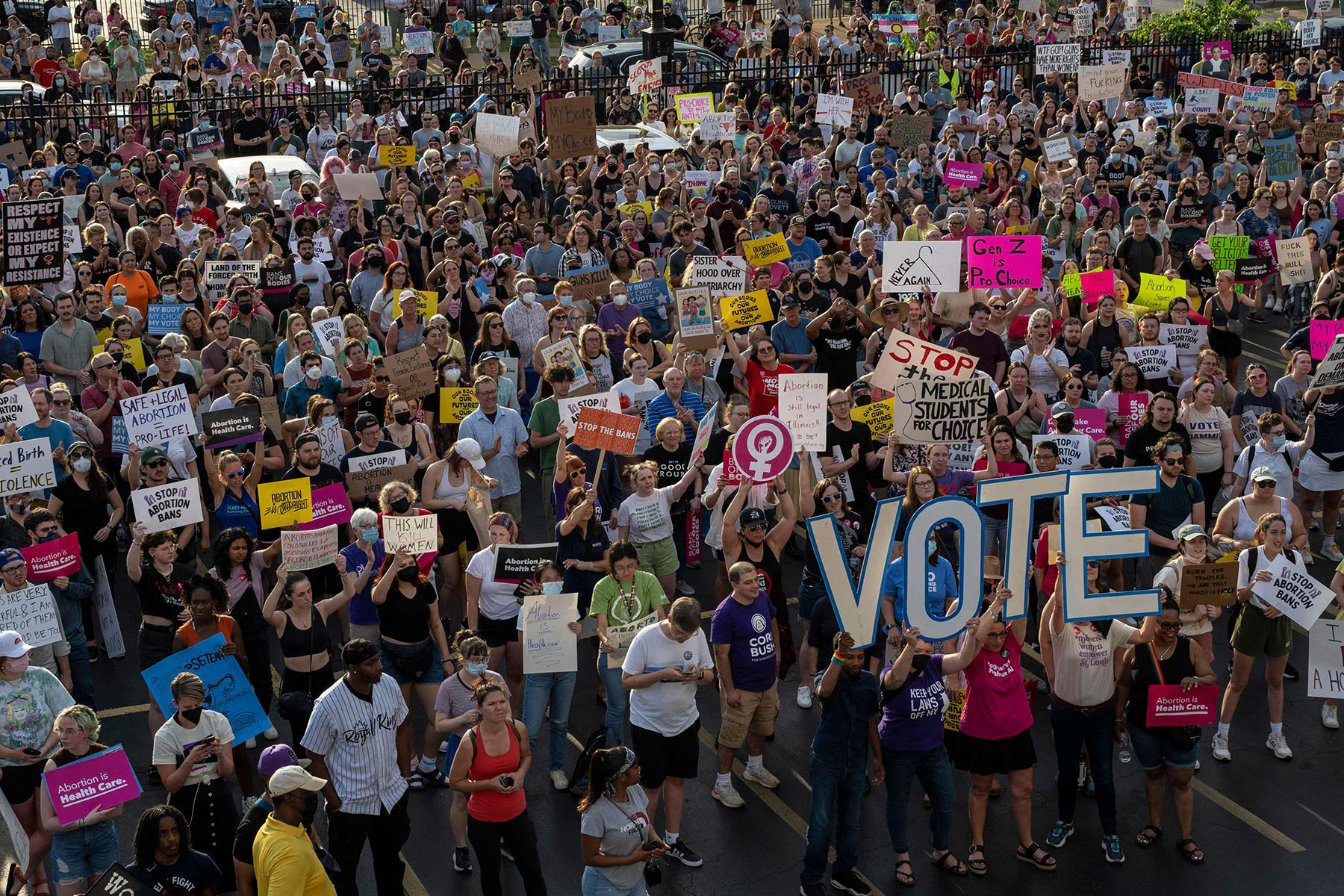Your trusted source for contextualizing Election 2024 and abortion news. Sign up for our daily newsletter.
Ten states across the country could enshrine the right to abortion in their state constitutions this year.
Seven states have directly voted on abortion since the U.S. Supreme Court overturned Roe v. Wade in June 2022 — and abortion rights advocates are so far undefeated with ballot measures. The most recent win came in November when Ohio became the latest state to vote to enshrine abortion rights in its constitution.
The proposed amendments have the potential to reshape abortion access around the country and mobilize voters. Abortion rights ballot measures outperformed Democrats on the ballot in California, Michigan and Vermont in the 2022 midterms.
Currently, 23 states enable citizens to put constitutional amendments on the ballot, while others only allow a state legislature to put them before the voters. While not all ballot measures are necessarily constitutional amendments, most of the efforts in 2024 are behind reshaping state constitutions to enshrine reproductive rights.
Ballot measure campaigns are highly expensive, time-consuming endeavors. In many states, Republican officials have endeavored to keep abortion measures off the ballot with legal challenges, shape the measures’ summary language and inflate their estimated cost.
In one case, they succeeded at stopping a measure from going in front of voters: Organizers in Arkansas submitted more signatures than required to put abortion rights on the ballot but lost a legal battle with the secretary of state’s office. The measure will not appear on the November ballot.
Here’s an overview of where abortion will — and could be — directly on the ballot in 2024 and the challenges advocates are facing in the states.
Arizona
Arizonans voted to add an abortion rights protection to their state constitution, according to a projection by Decision Desk HQ.
The measure would guarantee the right to an abortion up until the point of fetal viability, which varies from pregnancy to pregnancy but typically falls around 22 to 25 weeks. Currently, abortion in Arizona is banned after 15 weeks with no exceptions for rape or incest.
The Arizona measure marks the second time activists have attempted to enact a state abortion rights protection through direct democracy. The first effort, launched after the 2022 overturn of Roe v. Wade, did not get enough signatures to make it onto the ballot.
The measure’s passage also comes after a tumultuous back-and-forth this spring, when a state Supreme Court decision said Arizona could enforce a near-total abortion ban passed in 1864. The decision sparked outrage in Arizona, leading the state legislature to repeal the 19th-century law.
Laura Dent, campaign manager for the Prop 139 campaign, said she was over the moon with the results. “It’s incredible, it’s so decisive and so resounding,” she said. “I’m just really grateful to voters in the state.”
- Current law: Arizona bans abortion after 15 weeks of pregnancy with no exceptions for rape or incest. There was a tumultuous back-and-forth on the issue this spring, when a state Supreme Court decision said Arizona could enforce a near-total abortion ban passed in 1864. The decision sparked outrage in Arizona, leading the state legislature to repeal the 19th-century law.
- Political landscape: Arizona is a swing state in the presidential race; President Joe Biden won in 2020 by just over 10,000 votes. Abortion is also likely to be a significant issue in Arizona’s competitive U.S. Senate election.
- Arizona’s ballot measure could shift the narrative on Latinas and abortion
- Why Arizona organizers aren’t shying away from saying ‘abortion
Colorado
Coloradans voted for a ballot measure that would repeal the state’s ban on public funding for abortions, exceeding the 55 percent mark needed in the state, according to a projection by Decision Desk HQ.
Abortion is already legal throughout pregnancy in Colorado. But the right to an abortion was not yet guaranteed by the state’s constitution.
“Putting that into our constitution — I think that is really showing our state and people in our state want to continue to lead the way on progressivism,” said Dusti Gurule, president of Colorado Organization for Latina Opportunity and Reproductive Rights, which campaigned for the measure.
The state also previously prohibited use of state funds to pay for abortions, which in turn prevented public insurance programs — such as state health insurance, or Medicaid, which insures low-income people — from covering the procedure.
- Current law: Abortion is legally protected with no gestational limits in Colorado. Lawmakers established a legal right to abortion in 2022 and passed additional protections for patients traveling to Colorado from other states. Voters have also repeatedly rejected constitutional amendments that would restrict abortion in the state.
- Political landscape: Biden carried Colorado by 13 points in 2020.
Florida
Floridians rejected an abortion protection to their state constitution, according to a projection by Decision Desk HQ. Though a majority of Florida voters supported the measure, it failed to clear the state’s required 60 percent supermajority, the highest threshold any abortion rights measure has been held to since Roe v. Wade’s overturn in 2022.
Ten states had abortion measures on the ballot, but Florida’s was one of the most closely watched, because of the high bar, the many restrictions on abortion throughout the South and efforts to thwart it.
The measure’s failure means Florida will continue to enforce a law banning abortion after six weeks of pregnancy. The law has been in effect since May 1.
The result is a significant loss for the state’s abortion rights movement. Republicans who largely oppose abortion control the state’s legislature and its governor’s mansion. Direct voting was, at least in the short term, the only likely way to undo the Florida ban.
Florida Gov. Ron DeSantis, who supports the six-week ban, vocally opposed the measure and leveraged public resources to try to undermine the abortion rights campaign. His state health department sought to stop local news channels from airing advertisements in favor of Amendment 4, an effort blocked by federal courts. Donald Trump, the Republican candidate for president and a Florida resident, also said he would vote against the measure.
The state is surrounded by states with strict six-week and near-total abortion bans. Prior to May 1, Florida, home to dozens of clinics and the nation’s third largest state by population, had become a destination for people seeking abortions, seeing one of the largest increases in out-of-state patients since Roe’s fall. Amendment 4’s passage means it could assume that status once again.
- Current law: As of May 1, abortion in Florida is banned after six weeks of pregnancy with exceptions for rape and incest up to 15 weeks.
- Political landscape: Florida and its 30 Electoral College votes hold significant sway in the presidential race, though the once-swing state has trended Republican in recent election cycles. Florida also has a competitive U.S. Senate race on the ballot.
- Challenges: Florida Gov. Ron DeSantis, who supports the six-week ban, vocally opposed the measure and leveraged public resources to try to undermine the abortion rights campaign. His state health department sought to stop local news channels from airing advertisements in favor of Amendment 4, an effort blocked by federal courts. Donald Trump, the Republican candidate for president and a Florida resident, also said he would vote against the measure.
- Florida’s abortion ban has an exception for fatal fetal anomalies. So why was this woman forced to go to Virginia?
- A list of all the ways DeSantis has tried to meddle in Florida’s abortion ballot measure
- Of 10 states with abortion ballot measures, only one requires 60 percent support to pass
Maryland
Maryland voters approved a constitutional amendment put on the ballot by the Democratic-controlled legislature that would enshrine a broad right to abortion and other reproductive rights, according to a projection by Decision Desk HQ.
Question 1 amends the state constitution to include “a right to reproductive freedom” — which in addition to abortion, includes language protecting the rights to contraception and other pregnancy-related health care.
Already, abortion in Maryland is legal up to fetal viability, typically around 22 to 25 weeks. The state allows abortions after that point if pregnancy poses a threat to the person’s life or health or if there is a fetal anomaly.
Public health insurance plans such as Medicaid are required to cover abortion, and the state’s shield law protects abortion providers who care for patients from states with bans. The state is also home to one of the country’s few all-trimester abortion clinics.
- Current law: Abortion is legal up to the point of fetal viability in Maryland. The right to abortion has been protected under state law since the 1990s.
- Political landscape: Biden carried Maryland by 33 points in 2020.
Missouri
Missouri voters approved a measure to add an abortion rights protection to their state constitution, a decision that could reverse the state’s near-total ban on the procedure, according to a projection by Decision Desk HQ.
Missouri would be the first state to overturn a near-total abortion ban.
Missouri has long been one of the nation’s most hostile states to abortion rights. Even before Roe v. Wade was overturned, a long history of state restrictions on the procedure had eliminated all but one abortion clinic in the state. In 2021, the last full year before Roe’s fall, only 150 abortions took place in Missouri, the lowest tally in the country.
“By saying yes to this powerful language, voters have demanded the return of the essential human rights and freedoms they lost after Roe was overturned,” said Nancy Northup, president of the Center for Reproductive Rights.
Abortion opponents — including the state’s Republican secretary of state — had fought for months to keep the measure, known as Amendment 3, from appearing on the Missouri ballot. Those efforts ultimately failed.
Even with Amendment 3’s passage, restoring abortion access to Missouri could be a long, difficult process. Abortion providers will have to individually challenge the state’s numerous abortion restrictions in court. In the past, Missouri lawmakers have refused to comply with voter-backed policy changes — notably a 2020 measure expanding eligibility for Medicaid — until forced to by courts.
“Today’s vote is the first step to end the abortion ban that has harmed countless patients and targeted providers,” said Emily Wales, the head of Planned Parenthood Great Planes Votes.
Abortion opponents in the state signaled they will continue to challenge the abortion rights measure. Mary Elizabeth Coleman, a conservative state senator who sought to keep the measure of Missouri’s ballot, said the election “won’t be the last time Missourians vote on so-called ‘reproductive rights.’”
“We stand ready to help defend the rights of Missouri’s parents, women, children, and babies, against the assaults that are planned by the proponents of Amendment 3,” said Mary Catherine Martin, senior counsel at the Thomas More Society, an anti-abortion legal organization that represented Coleman.
- Current law: Abortion is banned with no exceptions for rape or incest in Missouri.
- Challenges: The measure has faced a number of ultimately unsuccessful challenges The latest, a ruling by a county judge that the amendment was invalid and should not appear on the ballot, was overturned by the state Supreme Court on September 10.
- Political landscape: Trump won Missouri by 15 points in 2020.
- Missouri voters could undo their state’s abortion ban. Making abortion accessible is a different story.
Montana
Montanans approved a ballot measure that amended the state constitution to protect abortion up until the point of fetal viability, codifying current law in this red state, according to a projection from Decision Desk HQ.
The vote won’t change access to abortion but it will secure it. Though the state Supreme Court ruled in 1999 that Montana’s constitutional right to privacy included abortion, lawmakers have repeatedly tried to limit access. Abortion opponents in the state have said they hope to get the 1999 ruling overturned. The new constitutional amendment, which was backed by the local Planned Parenthood affiliate, undermines their likelihood of succeeding.
State Republican officials fought against the measure. The Montana Supreme Court rejected a challenge from GOP Attorney General Austin Knudsen, who argued the first version of Planned Parenthood’s proposed language was “legally insufficient” and “logrolls multiple distinct political choices into a single initiative.” The court also struck Knudsen’s proposed fiscal note estimating the measure would have a fiscal impact on the state.
- Current law: Abortion is legal to the point of fetal viability in Montana, though lawmakers have repeatedly tried to restrict the procedure. The state Supreme Court ruled in 1999 that the state constitution’s right to privacy includes a right to abortion.
- Political landscape: Trump carried Montana by 16 points in 2020. Red state Democratic Sen. Jon Tester faces a tough reelection fight.
- Challenges: The Montana Supreme Court has allowed the proposed measure to move forward, rejecting a challenge from GOP Attorney General Austin Knudsen, who argued the first version of Planned Parenthood’s proposed language was “legally insufficient” and “logrolls multiple distinct political choices into a single initiative.” The court also struck Knudsen’s proposed fiscal note estimating the measure would have a fiscal impact on the state.
Nebraska
Nebraskans voted to amend their state constitution to ban abortion after 12 weeks of pregnancy, according to The Associated Press.
More voters came out in favor of the 12-week ban amendment than did those for a competing measure that would have enshrined the right to an abortion up until fetal viability. The 12-week measure also leaves the door open to future restrictions in the first trimester. The abortion rights measure did not pass.
“While today is a disappointing day, the fight for our fundamental rights and freedoms never ends,” said Allie Berry, who managed the abortion rights campaign.
Currently, abortion in Nebraska is banned after 12 weeks, with exception for rape, incest and a threat to the life of the pregnant patient. The state’s 12-week ban led to a drop in abortions of almost 10 percent, according to data from the state health department.
Nebraska is the only state in the country to have had two competing abortion measures on the ballot. Abortion opponents unsuccessfully sought to keep the pro-abortion measure from appearing on the state ballot.
- Current law: Abortion is banned after 12 weeks in Nebraska with exceptions for rape, incest and threat to the life of the pregnant patient.
- Political landscape: Nebraska splits up its electoral votes by congressional district, and the Omaha-based 2nd District is a battleground in both the U.S. House and the Electoral College; Trump won the state overall by 19 points in 2020, but Biden carried the 2nd District with 56 percent of the vote.
- Challenges: The Nebraska Supreme Court heard arguments on September 9 in three separate lawsuits over the ballot measures, which must be certified by September 13 to appear on the November ballot. Two cases, including one brought by the conservative Thomas More Society, challenged the validity of the Nebraska Right to Abortion amendment on the basis that it violated a legal requirement for a proposed constitutional amendment to address a single subject. Another case brought by pro-abortion rights groups asked the court to allow both the amendments or neither to appear on the ballot.
The court ruled September 13 that both initatives would appear on the November ballot.
Nevada
Nevada residents voted in favor of a constitutional amendment to guarantee the right to an abortion up to 24 weeks of pregnancy, according to a projection from Decision Desk HQ.
Already, Nevada state law protects abortion up until this point, due to a law state lawmakers passed in the 1990s. But if added to the state constitution, an amendment would add another layer of security — it is far harder to repeal or be struck down by a state court.
In Nevada, constitutional amendments must pass in two consecutive election cycles. That means this measure will go before voters again in 2026. If it passes again, it will take effect.
- Current law: Abortion is already legal up to 24 weeks in Nevada.
- Political landscape: Nevada is a critical battleground state in the 2024 presidential race; Biden carried the state by 2.4 points in 2020. Democratic Sen. Jacky Rosen is also facing a competitive reelection race that will be key to Democrats’ hopes of holding control of the U.S. Senate.
- Challenges: A judge ruled in November that the first proposed measure filed by Nevadans for Reproductive Freedom violated Nevada’s requirement that ballot measures address a single subject, leading backers to submit a new initiative with narrower language in December. A judge approved that second proposed measure in January. But in a win for the coalition, the Nevada Supreme Court ruled that the original ballot petition language they submitted in November 2023 was constitutional and did not violate the single-subject rule.
New York
New Yorkers voted to amend their state constitution to include a broad equal rights amendment, according to a projection from Decision Desk HQ. The measure would ban a range of gender-based discrimination and establish a state right to abortion and other reproductive health care.
The measure protects against discrimination based on “ethnicity, national origin, age, disability, and sex, including sexual orientation, gender identity and pregnancy.”
“We were devastated when Roe v. Wade fell. But today New Yorkers protected reproductive freedom and left Roe’s limitations behind,” said Sasha Ahuja, Campaign Director of New Yorkers for Equal Rights.
“With the passage of Prop 1, New York now has some of the strongest protections in the country to ensure the safety and freedom of all New Yorkers,” she added.
Opponents of the measure criticized its potential protections for trans New Yorkers. The measure also drew powerful opposition from conservative billionaire Richard Uihlein, who spent millions against the amendment in recent weeks.
Already, abortion in the state is legal until 24 weeks of pregnancy; people who are further along can qualify for an exception if their physical or mental health is at risk or the fetus will not survive. In 2019, lawmakers removed abortion from the state’s criminal code.
A Republican state lawmaker sought to have the measure removed from the state’s November ballot. But in July, the state Supreme Court ruled otherwise, allowing the measure to stay on.
- Current law: Abortion is protected under state law. Lawmakers in 2019 removed abortion from being regulated in the state’s criminal code and allowed the procedure at any stage of pregnancy to save the patient’s life or health.
- Political landscape: New York has several competitive U.S. House races on the ballot and will be critical to Democrats’ chances of taking back control of the chamber. Some Democrats have said they hope the equal rights amendment will boost turnout for Democrats.
- Challenges: A local judge sided with a challenge from a Republican state lawmaker in striking the measure from the November ballot, ruling on May 7 that lawmakers didn’t follow the proper technical procedure to put the amendment before the voters. But the ruling was overturned after a challenge from New Yorkers for Equal Rights, the coalition supporting the amendment, with the state’s highest court ruling in July that the measure qualifies for the ballot.
South Dakota
South Dakotans voted against a proposal to amend their state constitution to guarantee the right to an abortion in the first trimester of pregnancy, according to The Associated Press.
The measure allowed the state to regulate abortion only in ways “reasonably related to the physical health of the pregnant woman” in the second trimester.”
Abortion is currently banned in South Dakota with minimal exceptions.
The South Dakota measure did not receive support form major reproductive rights groups, including the ACLU and regional Planned Parenthood affiliates, who argued that it did not go far enough in guaranteeing abortion protections.
- Current law: Abortion is banned in South Dakota with no exceptions for rape or incest. Voters rejected anti-abortion constitutional amendments in 2006 and 2008.
- Political landscape: Trump carried South Dakota by 26 points in 2020.
Where abortion has won on the ballot since 2022
California
California voted to enshrine a right to abortion and contraception in its state constitution in 2022. The measure passed with 67 percent of the vote; Biden won the state by 29 points in 2020.
Michigan
Michigan established a constitutional right to abortion and other reproductive health care, including contraception, miscarriage care, fertility treatment, and pre- and post-natal care in 2022. The measure passed with 57 percent of the vote; Biden won the state by three points in 2020.
Ohio
Ohio voted to protect a right to abortion up until the point of fetal viability as well as contraception, miscarriage care and fertility treatment in its state constitution in 2023. The measure passed with 57 percent of the vote; Trump won the state by eight points in 2020.
Vermont
Vermont voted to add a right to “personal reproductive autonomy,” including abortion, in its state constitution in 2022. The measure passed with 77 percent of the vote; Biden won by 35 points in 2020.




